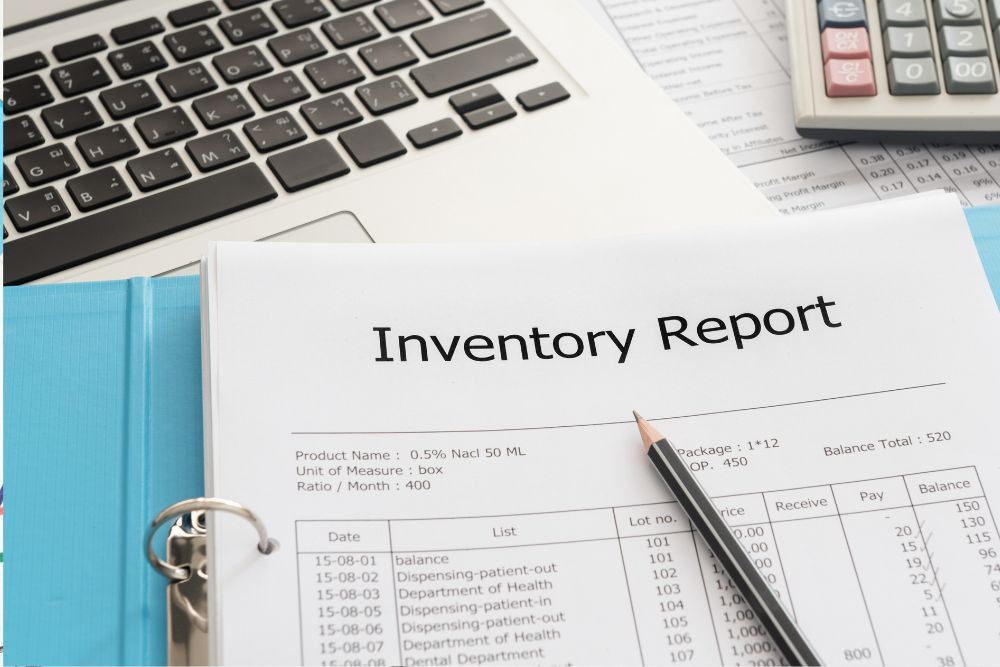5 Ways Accounting Services Can Optimize Inventory Management

Efficient inventory management is essential for profitability, cost control, and meeting customer demands, as inventory is one of the most important assets a company holds. Disorganized processes lead to overstocking, shortages, and inaccurate financial data. Professional accounting services help businesses streamline operations, reduce risks, and make data-driven decisions, ultimately strengthening financial health and operational efficiency.
Here are five ways accounting services can optimize inventory management.
Table of Contents
Key Takeaways
5 Essential Inventory Management Metrics Every Business Should Track
1. Inventory Turnover Ratio
2. Days Sales of Inventory (DSI)
3. Stockout Rate
4. Carrying Cost of Inventory
5. Gross Margin Return on Investment (GMROI)
5 Ways Accounting Services Can Optimize Inventory Management
1. Accurate Inventory Tracking
2. Enhancing Cost Control
3. Ensuring Compliance with Accounting Standards
4. Improving Cash Flow Management
5. Reducing the Risk of Inventory Fraud
How to Choose the Right Accounting Service for Your Business
Frequently Asked Questions (FAQs)
Optimize Inventory with Expert Accounting Services in New York City!
Key Takeaways
✔ Accurate inventory tracking helps businesses avoid costly errors and ensures efficient operations.
✔ Cost control through accounting services minimizes holding costs and improves profit margins.
✔ Compliance with accounting standards prevents penalties and ensures accurate financial reporting.
✔ Effective cash flow management ensures inventory doesn’t tie up capital, supporting financial stability.
✔ Accounting services reduce the risk of inventory fraud by implementing strong oversight and controls.
✔ Streamlined inventory reporting provides timely insights for better decision-making and transparency.

5 Essential Inventory Management Metrics Every Business Should Track
Tracking the right inventory metrics helps businesses make informed decisions, reduce costs, and optimize stock levels. Accounting services provide insights and tools to monitor these metrics accurately and ensure inventory processes run smoothly.
1. Inventory Turnover Ratio
The inventory turnover ratio measures how often a business sells and replaces its stock within a given period. A high turnover ratio indicates efficient inventory management and strong sales, while a low ratio may signal overstocking or slow-moving items.
Accounting services calculate this ratio by dividing the cost of goods sold (COGS) by the average inventory. Monitoring this metric helps businesses identify which products are performing well and which may need attention.
2. Days Sales of Inventory (DSI)
Days Sales of Inventory (DSI) measures the average number of days it takes for a business to sell its stock. A lower DSI means products are moving quickly, while a higher DSI indicates inventory is sitting idle for longer periods.
Accounting services track this metric to help businesses improve cash flow and avoid excess inventory. By calculating DSI, companies can better align stock levels with demand and reduce carrying costs.
3. Stockout Rate
The stockout rate measures how often a business runs out of inventory, leading to lost sales or dissatisfied customers. High stockout rates indicate poor demand forecasting or inefficient inventory management.
Accounting services monitor this metric to ensure businesses maintain optimal stock levels. Reducing the stockout rate helps maintain customer satisfaction and ensures that sales opportunities are not missed.
4. Carrying Cost of Inventory
Carrying cost of inventory refers to the total expenses of holding stock, including storage, insurance, and depreciation. High carrying costs can significantly impact a business’s profitability.
Accounting services track these costs to help identify ways to minimize expenses while maintaining sufficient inventory levels. Understanding carrying costs allows businesses to make strategic decisions about purchasing, storage, and inventory reduction.
5. Gross Margin Return on Investment (GMROI)
Gross Margin Return on Investment (GMROI) measures the profit a business earns from its inventory relative to the cost of that inventory. A high GMROI indicates that inventory investments are generating strong returns, while a low GMROI suggests inefficiencies.
Accounting services calculate GMROI by dividing the gross margin by the average inventory cost. This helps businesses assess the profitability of their inventory strategies and make adjustments as needed.

5 Ways Accounting Services Can Optimize Inventory Management
1. Accurate Inventory Tracking
Accurate inventory tracking helps businesses avoid costly errors and improve efficiency. Without reliable tracking, companies face discrepancies, wasted resources, and unhappy customers. Accounting services ensure that inventory counts remain precise, as it helps reduce risks and supports smooth operations.
Why Accurate Tracking is Essential
Prevents Inventory Discrepancies: Errors in tracking can lead to mismatched stock counts. Accounting services identify these errors early to ensure records align with physical inventory.
Improves Demand Forecasting: Reliable tracking provides data for predicting stock needs accurately. This helps businesses avoid overstocking or running out of products.
Reduces Waste and Loss: Accurate counts prevent unnecessary purchases and identify obsolete items. This reduces waste and potential financial loss.
How Accounting Services Help
Choosing the Right System: Accounting services recommend inventory management systems tailored to business needs. These systems automate tracking and reduce manual errors when managing inventories.
Regular Audits: Scheduled audits verify inventory accuracy by matching records with physical counts. This helps identify and correct errors quickly.
Integrating Financial Data: By linking inventory systems with financial records, accounting services ensure consistency across departments. This supports accurate financial reporting and better decision-making.
2. Enhancing Cost Control
Effective cost control in inventory management helps businesses avoid unnecessary expenses and improve profitability. Poorly managed inventory can lead to high carrying costs, spoilage, or overstocking. Accounting services provide detailed insights to keep inventory costs in check and enhance financial performance.
Why Cost Control Matters
Minimizes Holding Costs: Inventory storage costs can add up quickly. Accounting services track holding expenses to find ways to reduce storage fees.
Prevents Overstocking: Excess inventory ties up capital and increases the risk of obsolescence. By analyzing data, accounting services help maintain optimal stock levels.
Improves Profit Margins: Managing inventory costs ensures products are priced for profitability. Accurate cost analysis helps set pricing that covers expenses and supports growth.
How Accounting Services Help
Cost Analysis Reports: Accounting services generate detailed reports on inventory costs. These reports identify areas where spending can be reduced or optimized.
Implementing Cost Reduction Strategies: Accountants recommend strategies like bulk purchasing or vendor discounts. These tactics help businesses manage costs effectively when dealing with inventory.
Valuation Method Selection: Accounting services advise on inventory valuation methods such as First In, First Out (FIFO), Last In, First Out (LIFO), or weighted average cost. FIFO assumes the oldest inventory is sold first, while LIFO assumes the newest inventory is sold first. Weighted average calculates an average cost for all inventory, offering a balanced approach to valuation.
3. Ensuring Compliance with Accounting Standards
Inventory management must follow strict accounting standards to avoid errors and penalties. Non-compliance can result in financial misstatements and legal issues. Accounting services help ensure businesses meet regulations, protecting them from risks and maintaining credibility.
Why Compliance is Important
Avoids Penalties: Regulatory bodies, such as the IRS or SEC, impose fines for incorrect reporting, including misstatements in financial disclosures or tax filings. Accounting services help businesses stay compliant to avoid costly penalties.
Ensures Accurate Financial Reports: Compliance with accounting standards results in precise financial statements. Accurate reporting supports investor confidence and business growth.
Facilitates Audits: Maintaining compliance ensures businesses are prepared for IRS reviews and tax audits. Accurate records reduce the risk of penalties, simplify the filing process, and ensure deductions are properly documented.
How Accounting Services Help
Developing Compliance Policies: Accounting services collaborate with operations management to create inventory policies aligned with regulations. They provide financial expertise to ensure policies address valuation methods, cost tracking, and reporting requirements.
Regular Compliance Reviews: Accountants perform periodic checks of inventory records, valuation methods, and financial reports to ensure adherence to accounting standards. These reviews verify the accuracy of stock counts, proper cost allocation, and compliance with tax regulations.
Documentation Support: Accounting services work with operations teams to ensure inventory records include accurate financial data, such as valuation methods and cost allocation. This collaboration ensures compliance with regulations and provides reliable documentation for audits or inspections.
4. Improving Cash Flow Management
Inventory ties up significant capital, which can significantly impact cash flow. Effective cash flow management ensures businesses can meet financial obligations and invest in growth. Accounting services provide strategies to balance inventory levels and maintain healthy cash flow.
Why Cash Flow Matters
Reduces Tied-Up Capital: Excess inventory limits available cash for other expenses. Accounting services help optimize stock levels to free up working capital.
Supports Operational Expenses: Healthy cash flow ensures businesses can cover daily expenses. Effective inventory management helps maintain financial stability through optimized stock levels and reduced carrying costs.
Facilitates Growth Opportunities: Maintaining cash flow allows businesses to invest in expansion. Efficient inventory management supports financial readiness for growth by minimizing tied-up capital and improving turnover rates.
How Accounting Services Help
Inventory Turnover Analysis: Accounting services analyze how quickly inventory sells. This analysis helps businesses adjust stock levels to maintain cash flow.
Reorder Point Optimization: Accountants determine optimal reorder points based on demand and lead times. This ensures inventory is restocked without straining cash flow.
Supplier Payment Planning: Accounting services align payment schedules with cash inflows. This helps manage expenses without depleting cash reserves.
5. Reducing the Risk of Inventory Fraud
Inventory fraud can result in significant financial losses and damage to a business’s reputation. Preventing fraud requires strong oversight and control measures. Accounting services implement systems and checks to reduce the risk of fraudulent activity.
Why Fraud Prevention is Crucial
Protects Business Assets: Fraudulent activities, such as unauthorized stock removal or falsified inventory records, can deplete valuable inventor can deplete valuable inventory. Accounting services safeguard these assets through strict monitoring.
Maintains Accurate Records: Fraud can lead to misleading inventory data. Effective controls ensure inventory records remain accurate and trustworthy.
Preserve Reputation: Fraud, such as misreporting inventory levels, can lead to delayed deliveries or product shortages, directly impacting customers. Preventing fraud helps maintain a business’s credibility and integrity by ensuring consistent service and product availability.
How Accounting Services Help
Implementing Control Systems: Accounting services introduce checks, such as dual approvals for inventory handling. These controls prevent unauthorized activities.
Conducting Regular Reconciliations: Accountants compare physical stock with inventory records frequently. Discrepancies are then identified and investigated promptly.
Fraud Detection Audits: Accounting services perform targeted audits of physical stock, inventory records, order forms, and transaction logs to identify suspicious activities. These audits help catch signs of fraud early, such as discrepancies between stock counts and records or unauthorized transactions and mitigate risks effectively.
How to Choose the Right Accounting Service for Your Business
Choosing the right accounting services is crucial for maintaining efficient inventory management and overall financial health, especially as the demand for these services continues to rise. In fact, the revenue of the accounting services industry in the United States grew exponentially, reaching $147.5 billion in 2023 alone.
The right service provider can streamline operations, ensure compliance, and offer strategic insights tailored to a business's needs. Here are seven factors to consider when selecting accounting services that best fit a business's goals:
1. Industry Experience
Different industries have unique accounting and inventory management needs. Businesses should look for accounting services with experience in their specific industry to ensure they understand relevant regulations and challenges.
Industry-specific expertise helps provide accurate financial insights and efficient solutions. This experience ensures businesses receive specialized support for their inventory management processes.
2. Range of Services Offered
It’s essential to choose accounting services that offer a comprehensive suite of solutions, such as inventory management, tax preparation, and financial reporting. A full-service provider can address multiple financial needs under one roof, promoting efficiency and consistency.
Businesses benefit from seamless integration between inventory management and other accounting tasks. This approach also minimizes errors and enhances overall financial oversight.
3. Technology and Tools
The right accounting services should utilize modern accounting software and inventory management tools. Businesses should look for providers that offer cloud-based solutions, real-time reporting, and automated processes.
Advanced tools ensure accurate tracking, faster reporting, and improved data security. Technology-driven services help businesses stay competitive by enhancing efficiency and reducing manual errors.
4. Scalability and Flexibility
As businesses grow, their accounting needs become more complex. Choosing accounting services that can scale with the business ensures ongoing support during periods of expansion.
Flexible services can adapt to changing inventory levels, new product lines, or increased transaction volumes. Scalability ensures that businesses maintain effective inventory management and financial control as they evolve.
5. Reputation and Reviews
A provider's reputation is a strong indicator of the quality of their accounting services. Businesses should research reviews, testimonials, and case studies to understand a provider’s reliability and expertise.
Positive feedback from other clients reflects trustworthiness, accuracy, and professionalism. A reputable provider ensures businesses receive dependable support and valuable insights for optimizing inventory management.
6. Communication and Support
Clear communication and ongoing support are essential for effective accounting services. Businesses should choose providers who offer responsive customer service and regular updates on financial matters.
Reliable communication ensures businesses stay informed about inventory performance and any potential issues. With strong support, businesses can quickly resolve challenges and maintain seamless inventory management.
7. Cost and Pricing Structure
Understanding the cost and pricing structure of accounting services is essential for finding the right fit. Businesses should look for transparent pricing models that align with their budget and service needs. Whether it’s a flat fee, hourly rate, or customized package, the cost should reflect the value provided. Comparing pricing structures helps businesses select services that deliver quality support without unexpected expenses.
Frequently Asked Questions (FAQs)
What role do accounting services play in inventory budgeting?
Accounting services help businesses create accurate inventory budgets by analyzing historical data and forecasting demand. They assess costs related to purchasing, storing, and managing inventory to ensure budgets are realistic and aligned with business goals. By identifying trends and potential challenges, they help prevent overspending or underfunding.
How do accounting services help with inventory write-offs?
Inventory write-offs occur when stock becomes damaged, obsolete, or lost, impacting profitability. Accounting services manage these write-offs by accurately documenting the loss and ensuring it reflects in financial statements. They also analyze reasons behind write-offs to identify patterns and suggest preventative measures.
Can accounting services assist with inventory for e-commerce businesses?
Yes, accounting services are particularly valuable for e-commerce businesses with complex inventory needs. They track inventory across multiple platforms, warehouses, and sales channels to ensure accuracy. By integrating e-commerce systems with accounting software, they streamline inventory management and financial reporting. This ensures real-time visibility of stock levels and supports efficient order fulfillment.
How do accounting services help with inventory-related tax deductions?
Accounting services identify inventory-related expenses that qualify for tax deductions, such as costs for storage, shipping, or damaged goods. They ensure these deductions are documented accurately to maximize tax savings while maintaining compliance with regulations. By keeping detailed records, they help businesses substantiate their claims during tax filings. This reduces the risk of audits and ensures businesses take full advantage of available deductions.
How often should a business review its inventory management processes with accounting services?
Businesses should review inventory management processes with accounting services at least quarterly to ensure accuracy and efficiency. Regular reviews help identify trends, inefficiencies, or discrepancies before they become major issues. During these sessions, accountants provide insights and recommend adjustments to improve performance. Frequent evaluations ensure inventory processes stay aligned with business goals and market demands.

Optimize Inventory with Expert Accounting Services in New York City!
Fincadia Tax Services is dedicated to helping New York businesses thrive with expert accounting and inventory management solutions. We simplify financial processes and enhance operational efficiency by focusing on accurate tracking, cost control, and regulatory compliance. Whether it's reducing waste, improving cash flow, or supporting growth strategies, our tailored services are designed to meet the unique needs of businesses in a competitive market.
Partner with us today and experience accounting solutions that keep inventory organized and your business competitive.
Want tax & accounting tips and insights?
Sign up for our newsletter.